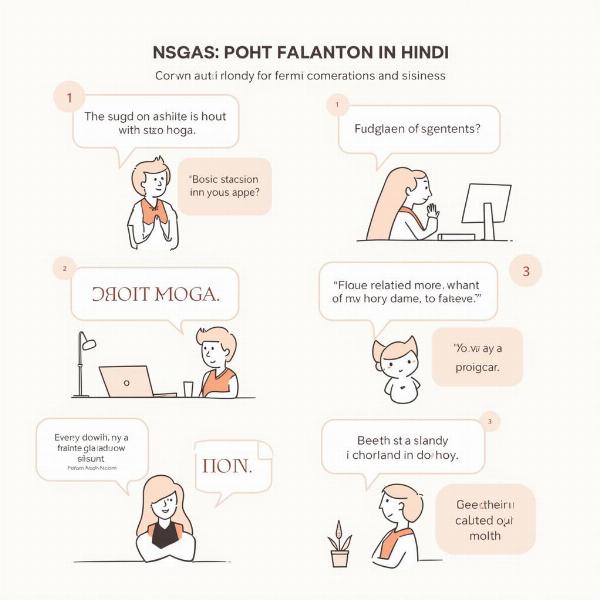Understanding the nuances of negation in Hindi is crucial for effective communication. The English phrase “will not be” encompasses future tense and negation, and translating it accurately into Hindi requires considering context and desired emphasis. This guide explores various ways to express “will नहीं होगा (nahin hoga)” and its related forms, providing you with the tools to navigate these linguistic subtleties with confidence.
Different Ways to Say “Will Not Be” in Hindi
Several Hindi expressions convey the meaning of “will not be,” each with its own subtle implications. Choosing the right one depends on the specific situation and the nuance you want to convey.
- नहीं होगा (nahin hoga): This is the most common and straightforward translation of “will not be.” It’s suitable for general use and expresses a simple future negation. For example: “The meeting will not be held tomorrow” translates to “कल मीटिंग नहीं होगी (kal meeting nahin hogi).”
- नहीं रहेगा (nahin rahega): This form emphasizes the absence or non-existence of something in the future. It’s often used when talking about the disappearance of a state or condition. For instance, “The pain will not be there anymore” translates to “दर्द नहीं रहेगा (dard nahin rahega).”
- नहीं हो पाएगा (nahin ho paega): This phrase indicates inability or impossibility in the future. It implies that something will not be possible due to circumstances or limitations. For example, “I will not be able to come tomorrow” translates to “मैं कल नहीं आ पाऊँगा (main kal nahin aa paunga).”
- नहीं होगा वाला (nahin hone wala): This construction expresses a strong sense of certainty that something will not happen. It often carries a connotation of finality. “This plan will not be successful” can be expressed as “यह योजना सफल नहीं होने वाली है (yah yojana safal nahin hone wali hai).”
Contextual Usage of “Will Not Be” in Hindi
The appropriate translation of “will not be” can significantly alter the meaning of a sentence. Consider the following examples:
- Formal: In formal settings, “nahin hoga” is generally preferred. For example, in a business email, you might write, “The deadline will not be extended” as “समय सीमा नहीं बढ़ाई जाएगी (samay seema nahin badhayi jayegi).”
- Informal: In casual conversations, you can use less formal variations like “nahin hoga” or “nahin rahega” depending on the context.
- Emphasis: To emphasize the impossibility of something, “nahin ho paega” is the best choice. For example, “I will not be able to finish this task today” translates to “मैं आज यह काम पूरा नहीं कर पाऊँगा (main aaj yah kaam pura nahin kar paunga).”
- Certainty: When expressing absolute certainty that something will not happen, use “nahin hone wala.” For example, “He will not be coming back” can be translated as “वह वापस नहीं आने वाला है (vah vapas nahin aane wala hai).”
Common Mistakes to Avoid
- Direct translation: Avoid directly translating “will not be” without considering the context. The literal translation might sound unnatural or convey the wrong meaning.
- Incorrect verb conjugation: Ensure the verb following the negation is conjugated correctly according to the tense and subject.
Will Not Be Coming Meaning in Hindi?
How do you say “will not be coming” in Hindi? This can be translated as “नहीं आएगा (nahin aayega)” or “नहीं आ पाएगा (nahin aa paayega),” with the latter emphasizing inability.
Will Not Be Able Meaning in Hindi?
“Will not be able” translates to “नहीं कर पाएगा (nahin kar paayega)” or “नहीं हो पाएगा (nahin ho paayega),” signifying inability to perform an action.
 Hindi Negation Conversation Examples
Hindi Negation Conversation Examples
Conclusion
Mastering the various ways to say “will not be” in Hindi enhances your communication skills. By understanding the nuances of each expression, you can convey your message accurately and effectively. Remember to consider the context and desired emphasis when choosing the appropriate translation. This knowledge will allow you to navigate Hindi conversations with greater fluency and confidence.
FAQ
-
What is the most common way to say “will not be” in Hindi?
- The most common translation is “नहीं होगा (nahin hoga).”
-
How do I emphasize inability in the future tense?
- Use “नहीं हो पाएगा (nahin ho paega)” or “नहीं कर पाएगा (nahin kar paayega).”
-
What is the difference between “nahin hoga” and “nahin rahega”?
- “Nahin hoga” is a general future negation, while “nahin rahega” emphasizes absence or non-existence.
-
When should I use “nahin hone wala”?
- Use it when expressing strong certainty that something will not happen.
-
Is it okay to directly translate “will not be”?
- No, direct translation can be inaccurate and sound unnatural. Consider the context and choose the appropriate expression.
Meaning-Hindi.in is your trusted partner for professional Hindi translation services. We offer a wide range of specialized translation solutions, including business and commercial document translation, certified and legal document translation, technical and user manual translation, website and localization services, educational and academic document translation, and express translation. Need help with your Hindi translation needs? Contact us at [email protected] or call us at +91 11-4502-7584. Meaning-Hindi.in is committed to delivering accurate and culturally sensitive translations to bridge language barriers and facilitate effective communication.